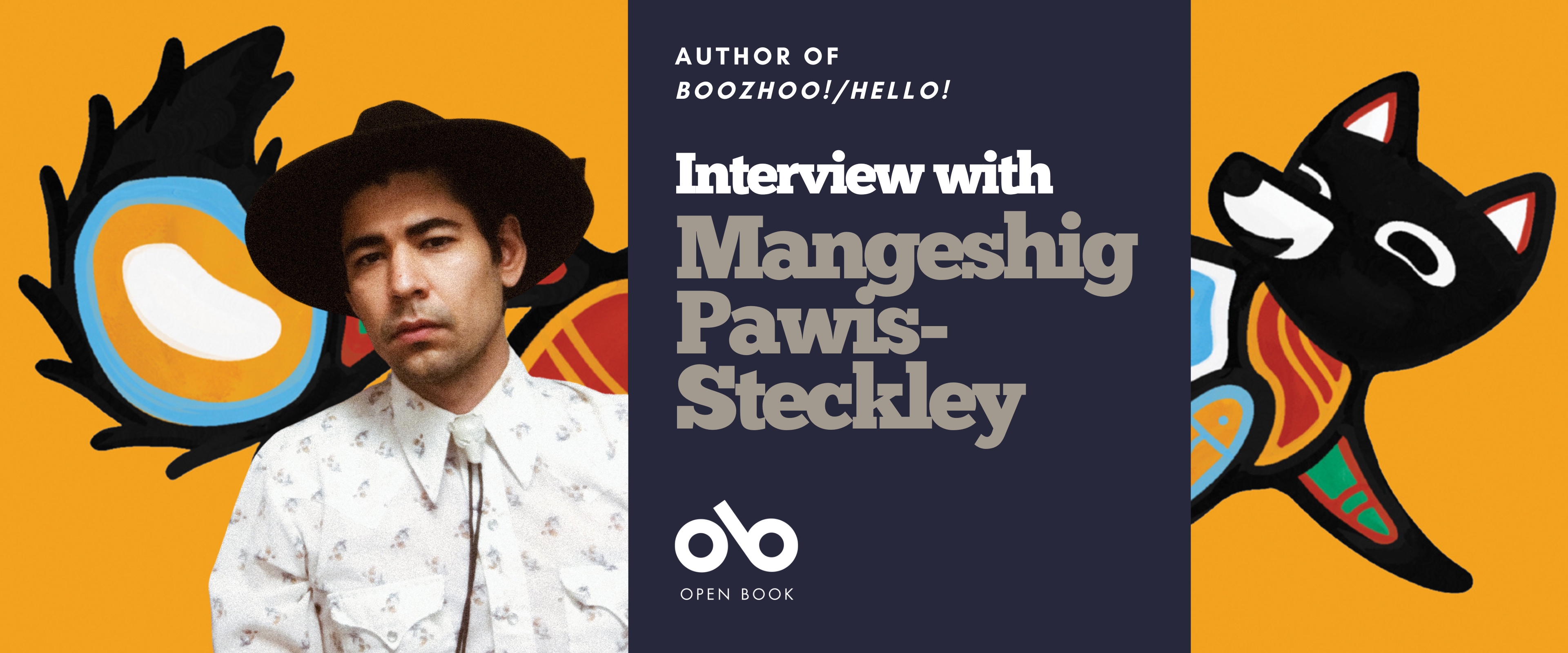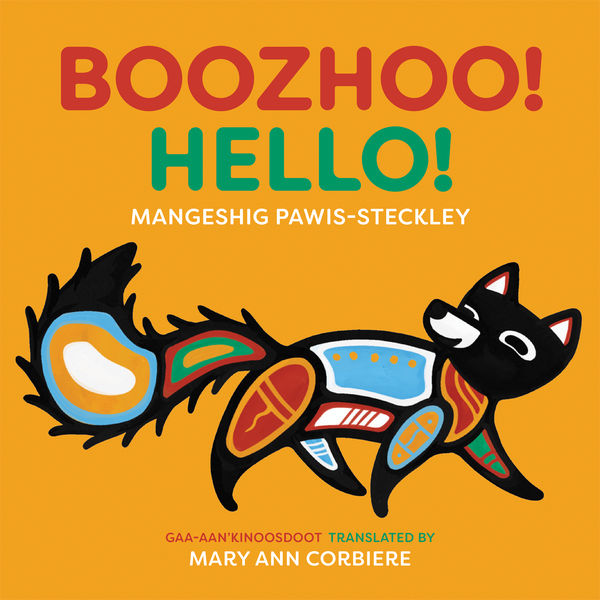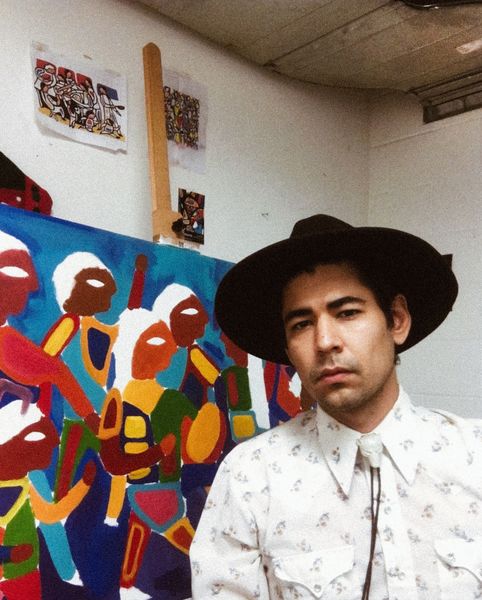Mangeshig Pawis-Steckley's Wonderful Woodland Art Leaps Off the Page in Boozhoo!/Hello!
Teaching young people about wildlife and nature is a crucial part of storytelling, and a great picture book can achieve this with art and language. There are many examples of these titles, but the new book from Mangeshig Pawis-Steckley in unique in its own way.
With Boozhoo!/Hello! (Groundwood Books), the author uses beautiful Woodland art to show land and water animals in their natural habitat, going about their daily activities. The illustrations draw the reader's eye to foxes, minnows, bees, and more, with wonderful art that leaps off the page. It's a joy to read and view for all.
The art is accompanied by words in both Anishinaabemowin and English, giving speakers of the former language an opportunity to read about these animals as described in their native tongue. In working with other authors as an illustrator, and after drawing Woodland illustrations of animals for his daughter, Pawis-Steckley decided that there was a place waiting for a picture book like this, with other young readers eager to see Anishinaabemowin text (translated from English by Mary Ann Corbiere).
Learn more about this exciting new title, and about the author's journey as they conceived and created Boozhoo!/Hello!
Open Book:
Tell us about your new book and how it came to be.
Mangeshig Pawis-Steckley:
I began drawing the illustrations as a fun way to teach my daughter some animals and introduce her to woodland art. When she was a newborn, I made them all in black and white, and as she got older and focused more on colours and patterns, I added colour to them.
I was thinking of an idea for a language board book for a while and thought this is it right here. This could be something really great for introducing children to Anishinaabemowin. There are a few books out there, but the selection is still very limited. I thought of Groundwood, who I had worked with before on a couple of bilingual books both written by Brittany Luby. I compiled all the art and wrote the text that taught a handful of nouns and verbs. Groundwood loved the idea, and we turned it into a hardcover with the possibility of a board book later on.
OB:
Did the book look the same in the end as your originally envisioned it when you started working, or did it change through the writing process?
MPS:
Yes, it mostly stayed the same! I had a pretty strong vision of how I wanted it to look with the bright palette of basic colours, simple and fun illustrations, and big text with Anishinaabemowin translations. The only big change was from board book to hardcover. That change nearly doubled the amount of pages, so we were able to include a few more animals.
Your CanLit News
Subscribe to Open Book’s newsletter to get local book events, literary content, writing tips, and more in your inbox
OB:
What was the strangest or most memorable moment or experience during the writing process for you?
MPS:
The most memorable experience was after the writing was done and I got the books delivered. When opening the box my daughter recognized the artwork and said “dada’s book!” with much excitement. I think reading it to her for the first time had to be one of the best experiences of my life so far. She always waves to all the animals and says hello. She’s even starting to pick up on the Anishinaabemowin now too.
OB:
What do you need in order to write – in terms of space, food, rituals, writing instruments?
MPS:
I just need a quiet space and some good coffee.
OB:
How do you cope with setbacks or tough points during the writing process? Do you have any strategies that are your go-to responses to difficult points in the process?
MPS:
There are a few go-to options I have when writing. First, I don’t try to rush things. I take my time with the words. Let them come naturally. I like to go on walks with my daughter while I think about the pages. If nothing seems to come, I have a couple of options. I can ask my fiancé, my literary agent, or any family or friends. It’s always great to get some good feedback and other perspectives. Or I read other stories. Sometimes all you need is a little inspiration!
A good tip to keep in mind is to never get stuck with a certain idea. No matter how much you love it or how much you think it fits. There can always be way to make everything work, and sometimes it requires letting things go.
OB:
What are you working on now?
MPS:
Right now, it’s been a busy few months. I have a few projects I’m working on.
I’m just wrapping up my next author/illustrator book which is more of a storybook for ages 5-8. It’s titled The Trickster Shadow and will be published with Little Brown and Co. Everything for this book is finished, just a few minor touches need to be worked through! Keep your eyes open for it early next year!
I’m nearly finished illustrating a picture book titled Canada written by the late Richard Wagamese, with Tundra Books. I am extremely excited for this one! Richard has always been one of my favourite Indigenous authors and to get the opportunity to illustrate some of his words has been a great honour. The book is set to be published in 2026.
I’m also illustrating a book with Tradewind Books, written by Carrie Anne Vanderhoop (Wampanoag/Haida). It’s a wholesome story about the seasons and set in Aquinnah, Massachusetts where Carrie Anne spent a lot of her childhood.
Coming up next, I’ll be working on my first graphic novel. It’s a bit of a change of pace. It’s a survivor-centred narrative of a residential school survivor and his son. Renowned Anishinaabe journalist, Duncan McCue, has conducted the interviews and written the story.
And a children’s book written by Joy Harjo will be in the works early next year.
____________________________________________________
Mangeshig Pawis-Steckley is an Anishinaabe illustrator and a member of Wasauksing First Nation. He illustrated the award-winning picture book Mii maanda ezhi-gkendmaanh / This Is How I Know and Mnoomin maan'gowing / The Gift of Mnoomin, both by Brittany Luby, and is the author and illustrator of Boozhoo! / Hello! He lives in the unceded territories of the xʷməθkʷəy̓əm (Musqueam), Sḵwx̱wú7mesh (Squamish) and səlilwətaɬ (Tsleil-Waututh) peoples (Vancouver) with his wife Maria and daughter Mino.






